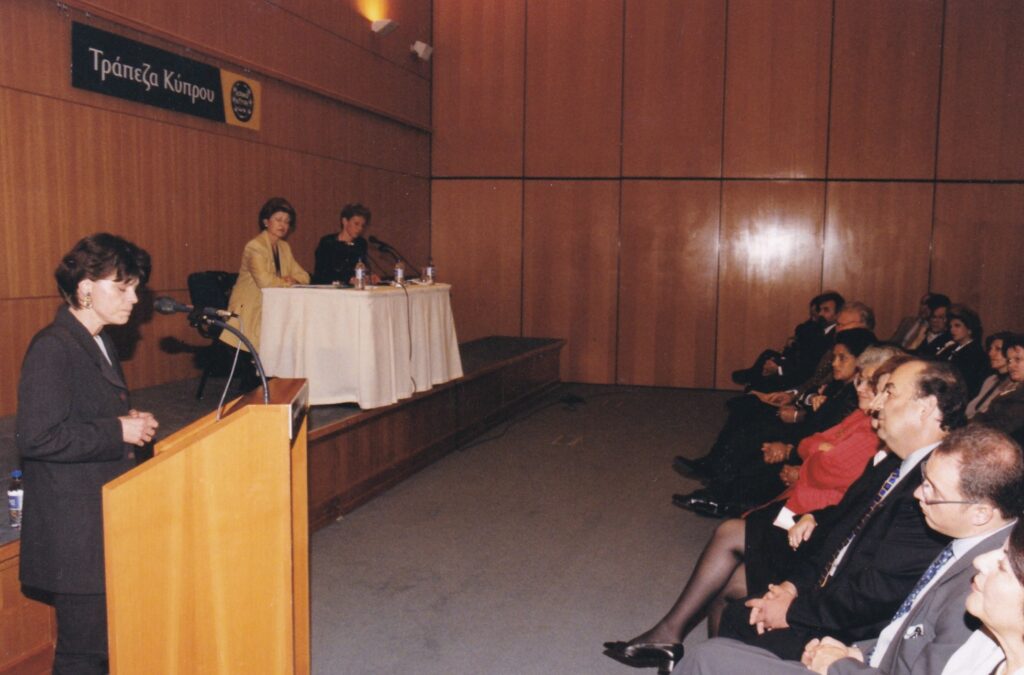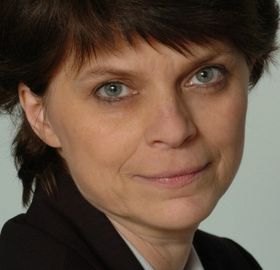Barbara Helfferich (Germany/Belgium)
Here, you will find the English version of the biographical note of the laureate, followed by the French one and some photos. — Voici la version anglaise de la notice biographique du lauréate, suivie de la version française et de quelques photos.
Born as the youngest of four children, Barbara Helfferich grew up in Westphalia, a region in Northern Germany renowned for its significant role in ending the 30-year war with the conclusion of the Westphalian Peace Treaty. Her family roots cover the entire political spectrum: her one uncle was a part of the delegation, signing the Versailles Treaty, while another uncle was as Finance Minister amongst the culprits of the assassination of the German Foreign Affairs Minister (who had insisted that Germany should fulfil its obligations of that treaty). She never bemoaned that she was experiencing this conflict between the right and the left through her parents – even though she felt the need to stick to one side. Her upbringing was chiefly influenced by her mother, a pioneer as one of the first women in Germany admitted to study veterinary medicine. Together with her mother, Barbara was involved in establishing a pioneering women’s shelter, the first of its kind in rural Germany.
Graduating from an all-boys high school was the opportunity Barbara sought to depart from the rather conservative area to pursue studies in the United States. At Columbia University and UC Berkeley, she delved into Philosophy, History, Politics, and Journalism. Subsequently, her academic journey led her to research the situation of single mothers in Mexico City.
Her career path evolved as she embarked on a teaching position in Tokyo before completing her Ph.D. at Columbia University. She then taught Latin American and Caribbean Studies at another New York-based university. However, academia did not fully satisfy her activist spirit. Upon encountering a job opening for the Secretary General of the network of all European women’s organizations in Brussels, she applied and was appointed. As the Secretary General of the “European Women’s Lobby,” she profoundly influenced the female – and arguably more feminist – civil society voice in the EU for nearly a decade.
Recognizing the need for foundational change, Barbara and her team developed concrete proposals to revise the European Treaties. Their efforts found traction when Spain, then holding the EU presidency, incorporated these proposals into the reformulation of the EU constitutional treaties, thereby embedding Barbara’s ideas for equality.
The Balkan wars of the 1990s marked another turning point in her commitments. She actively participated in a Europe-wide initiative facilitating dialogue between Croatian and Serbian women on peace terms. Additionally, she continued her peace efforts within the Greek and Turkish-speaking Cypriot women’s communities.
When a Greek woman assumed the role of EU Commissioner, Barbara was invited to join her cabinet. With “equality in all areas” constitutionally recognized, they successfully pushed for the introduction of a European equality directive. Despite media turmoil sparked by a premature leak of the draft, the Directive became part of EU legislation, albeit in a less ambitious form, but still benefiting numerous women across Europe, even today.
Driven by her belief that the climate crisis needed a gender perspective, Barbara joined the team of the subsequent Greek EU Commissioner for the Environment. Serving as an EU Spokesperson for the environment, she sought to combine her varied passions: feminism, multiculturalism, environment, peace, biodiversity, and climate.
Upon completion of her role as a spokesperson, she joined a US wildlife conservation organization, broadening her scope of work. This opportunity facilitated international connections, including supporting the only female Afghan governor and enabling young Afghans to receive vocational training.
In 2015, after years as a key figure in hierarchical structures, Barbara opted to become an independent contractor to align more closely with her values. Since then, she has been a “traveling feminist,” collaborating with and working for various organizations such as the European Trade Union Organisation (ETUC), University Ludwigsburg in Germany, Friedrich-Ebert-Foundation, European Economic and Social Committee (ECOSOC), Council of Europe, European Institute for Gender Equality (EIGE), European Transport Federation, ILO (the Geneva-based UN International Labour Organization), among others. In recent years, she embarked on training as a Mindfulness teacher, a practice she continues to uphold.
While actively engaged as an independent contractor, Barbara dedicates her efforts to supporting Gender Five Plus, a feminist Think Tank she co-founded a decade ago. She remains an activist, pacifist, and feminist. She is also advocating for animal rights addressing and giving voice to the commonalities between the oppression of animals and patriarchal oppression.
================================================================
Barbara Helfferich (Allemagne/Belgique)
Benjamine d’une famille de quatre enfants, Barbara Helfferich a grandi en Westphalie, une région du nord de l’Allemagne réputée pour le rôle important qu’elle a joué dans la conclusion du traité de paix de Westphalie, qui a mis fin à 30 ans de guerre. Les racines de sa famille couvrent tout l’éventail politique : son oncle faisait partie de la délégation qui a signé le traité de Versailles, tandis qu’un autre oncle était, en tant que ministre des finances, l’un des coupables de l’assassinat du ministre allemand des affaires étrangères (qui avait insisté pour que l’Allemagne remplisse ses obligations dans le cadre de ce traité). Elle n’a jamais regretté d’avoir vécu ce conflit entre la droite et la gauche à travers ses parents, même si elle a ressenti le besoin de se ranger d’un côté ou de l’autre. Son éducation a été principalement influencée par sa mère, une pionnière puisqu’elle a été l’une des premières femmes en Allemagne à être admise à étudier la médecine vétérinaire. Avec sa mère, Barbara a participé à la création d’un centre d’accueil pour femmes, le premier du genre dans l’Allemagne rurale.
L’obtention de son diplôme dans un lycée exclusivement masculin a été l’occasion pour Barbara de s’éloigner de cette région plutôt conservatrice et de poursuivre ses études aux États-Unis. À l’université de Columbia et à l’université de Berkeley, elle étudie la philosophie, l’histoire, la politique et le journalisme. Par la suite, son parcours académique l’a amenée à faire des recherches sur la situation des mères célibataires à Mexico.
Son parcours professionnel a évolué lorsqu’elle a commencé à enseigner à Tokyo avant de terminer son doctorat à l’université de Columbia. Elle a ensuite enseigné les études latino-américaines et caribéennes dans une autre université new-yorkaise. Cependant, le monde universitaire ne satisfaisait pas pleinement son esprit militant. Lorsqu’elle découvre une offre d’emploi pour le poste de secrétaire général du réseau de toutes les organisations européennes de femmes à Bruxelles, elle pose sa candidature et est nommée. En tant que secrétaire générale du “Lobby européen des femmes”, elle a profondément influencé la voix de la société civile féminine – et sans doute plus féministe – dans l’UE pendant près d’une décennie.
Reconnaissant la nécessité d’un changement fondamental, Barbara et son équipe ont élaboré des propositions concrètes pour réviser les traités européens. Leurs efforts ont été couronnés de succès lorsque l’Espagne, qui assurait alors la présidence de l’UE, a intégré ces propositions dans la reformulation des traités constitutionnels de l’UE, concrétisant ainsi les idées de Barbara en matière d’égalité.
Les guerres des Balkans des années 1990 ont marqué un autre tournant dans ses engagements. Elle participe activement à une initiative européenne visant à faciliter le dialogue entre les femmes croates et serbes sur les conditions de la paix. En outre, elle a poursuivi ses efforts de paix au sein des communautés chypriotes de langue grecque et turque.
Lorsqu’une femme grecque a accédé au poste de commissaire européen, Barbara a été invitée à rejoindre son cabinet. L’égalité dans tous les domaines étant reconnue par la Constitution, elles ont réussi à faire adopter une directive européenne sur l’égalité. Malgré l’agitation médiatique provoquée par une fuite prématurée du projet, la directive a été intégrée à la législation européenne, sous une forme certes moins ambitieuse, mais dont bénéficient encore aujourd’hui de nombreuses femmes dans toute l’Europe.






